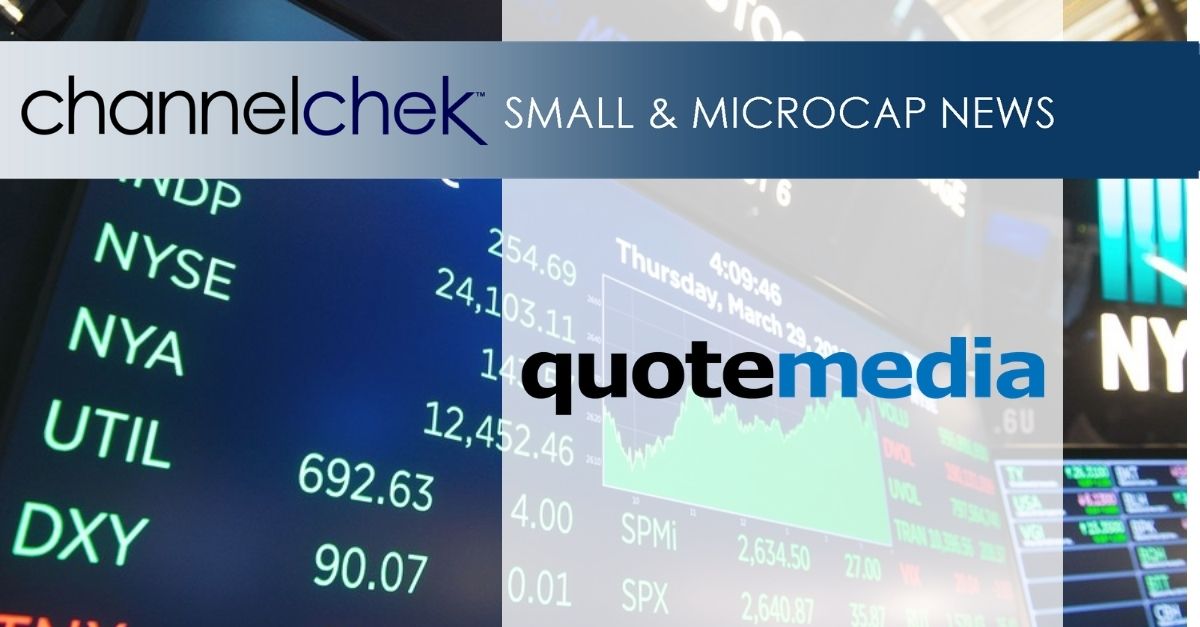
Research News and Market Data on QMCI
PHOENIX, Nov. 13, 2023 (GLOBE NEWSWIRE) — QuoteMedia, Inc. (OTCQB: QMCI), a leading provider of market data and financial applications, announced financial results for the quarter ended September 30, 2023.
QuoteMedia provides banks, brokerage firms, private equity firms, financial planners and sophisticated investors with a more economical, higher quality alternative source of stock market data and related research information. We compete with several larger legacy organizations and a modest community of other smaller companies. QuoteMedia provides comprehensive market data services, including streaming data feeds, on-demand request-based data (XML/JSON), analytics and research, trade integration, web content solutions (financial content for website integration) and applications such as Quotestream Professional and Quotestream Web Trader.
Highlights for Q3 2023 include the following:
- Quarterly revenue increased by 8% to $4,762,442 in Q3 2023 from $4,390,667 in Q3 2022, an increase of $371,775.
- On an FX-neutral basis (FXN), revenue growth for Q3 2023 vs Q3 2022 was 10% (1) .
- Adjusted EBITDA for Q3 2023 was $719,547 compared to $670,145 in Q3 2022, an improvement of $49,402 (7%) (1) .
- Deferred revenue was $2,049,664 at September 30, 2023. This is an $882,816 (76%) increase from the $1,166,848 deferred revenue balance at December 31, 2023.
“This has been another good quarter for QuoteMedia,” said Robert J. Thompson, Chairman of the Board. “We have closed and launched important new clients, and completed substantial product development, all of which will lead to continuing revenue growth. Additionally, we have a healthy sales pipeline and are continuing exploratory discussions with several large firms about major deployments. We are now enjoying increasing market penetration as our successes over past periods are gaining notice throughout the industry.”
QuoteMedia will host a conference call Tuesday, November 14, 2023 at 2:00 PM Eastern Time to discuss the Q3 2023 financial results and provide a business update.
Conference Call Details:
Date: November 14, 2023
Time: 2:00 PM Eastern
Dial-in numbers: 800-343-4136; 203-518-9814
Conference ID: QUOTEMEDIA
An audio rebroadcast of the call will be available later at: www.quotemedia.com
About QuoteMedia
QuoteMedia is a leading software developer and cloud-based syndicator of financial market information and streaming financial data solutions to media, corporations, online brokerages, and financial services companies. The Company licenses interactive stock research tools such as streaming real-time quotes, market research, news, charting, option chains, filings, corporate financials, insider reports, market indices, portfolio management systems, and data feeds. QuoteMedia provides industry leading market data solutions and financial services for companies such as the Nasdaq Stock Exchange, TMX Group (TSX Stock Exchange), Canadian Securities Exchange (CSE), London Stock Exchange Group, FIS, U.S. Bank, Bank of Montreal (BMO), Broadridge Financial Systems, JPMorgan Chase, Scotiabank, CI Financial, Canaccord Genuity Corp., Hilltop Securities, Avantax, Stockhouse, Zacks Investment Research, General Electric, Boeing, Bombardier, Telus International, Business Wire, PR Newswire, The Goldman Sachs Group, Regal Securities, ChoiceTrade, Cetera Financial Group, Dynamic Trend, Inc., Credential Qtrade Securities, CNW Group, iA Private Wealth, Ally Invest, Inc., Suncor, Leede Jones Gable, Firstrade Securities, Charles Schwab, First Financial, Equisolve, Stock-Trak, Mergent, Cision and others. Quotestream®, QMod TM and Quotestream Connect TM are trademarks of QuoteMedia. For more information, please visit www.quotemedia.com .
Statements about QuoteMedia’s future expectations, including future revenue, earnings, and transactions, as well as all other statements in this press release other than historical facts are “forward-looking statements” within the meaning of the Private Securities Litigation Reform Act of 1995. QuoteMedia intends that such forward-looking statements be subject to the safe harbors created thereby. These statements involve risks and uncertainties that are identified from time to time in the Company’s SEC reports and filings and are subject to change at any time. QuoteMedia’s actual results and other corporate developments could differ materially from that which has been anticipated in such statements.
QuoteMedia Investor Relations
Brendan Hopkins
Email: investors@quotemedia.com
Call: (407) 645-5295
Note 1 on Non-GAAP Financial Measures
We believe that Adjusted EBITDA, as a non-GAAP pro forma financial measure, provides meaningful information to investors in terms of enhancing their understanding of our operating performance and results, as it allows investors to more easily compare our financial performance on a consistent basis compared to the prior year periods. This non-GAAP financial measure also corresponds with the way we expect investment analysts to evaluate and compare our results. Any non-GAAP pro forma financial measures should be considered only as supplements to, and not as substitutes for or in isolation from, or superior to, our other measures of financial information prepared in accordance with GAAP, such as net income attributable to QuoteMedia, Inc.
We define and calculate Adjusted EBITDA as net income attributable to QuoteMedia, Inc., plus: 1) depreciation and amortization, 2) stock compensation expense, 3) interest expense, 4) foreign exchange loss (or minus a foreign exchange gain), and 5) income tax expense. We disclose Adjusted EBITDA because we believe it is a useful metric by which to compare the performance of our business from period to period. We understand that measures similar to Adjusted EBITDA are broadly used by analysts, rating agencies, investors and financial institutions in assessing our performance. Accordingly, we believe that the presentation of Adjusted EBITDA provides useful information to investors. The table below provides a reconciliation of Adjusted EBITDA to net income attributable to QuoteMedia, Inc., the most directly comparable GAAP financial measure.
QuoteMedia, Inc. Adjusted EBITDA Reconciliation to Net Income:
| Three-months ended September 30, | 2023 | 2022 | |||||
| Net income | $ | 126,036 | $ | 309,543 | |||
| Depreciation and amortization | 672,588 | 545,076 | |||||
| Stock-based compensation | (57,188 | ) | (82,888 | ) | |||
| Interest income, net | (825 | ) | (10 | ) | |||
| Foreign exchange gain | (21,803 | ) | (102,327 | ) | |||
| Income tax expense | 739 | 751 | |||||
| Adjusted EBITDA | $ | 719,547 | $ | 670,145 | |||
In addition to the non-GAAP measures discussed above, we also analyze certain measures, including net revenues and operating expenses, on an FX-neutral basis to better measure the comparability of operating results between periods. Management believes that changes in foreign currency exchange rates are not indicative of the company’s operations and evaluating growth in net revenues and operating expenses on an FX-neutral basis provides an additional meaningful and comparable assessment of these measures to both management and investors. FX-neutral results are calculated by translating the current period’s local currency results with the prior period’s exchange rate. FX-neutral growth rates are calculated by comparing the current period’s FX-neutral results by the prior period’s results.
News Provided by GlobeNewswire via QuoteMedia


